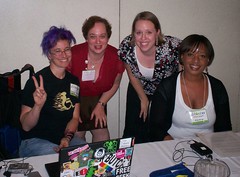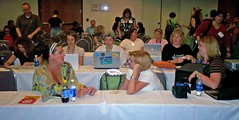 BlogHer felt like an overwhelming success to me this year. I had cute shoes. The conference venue was gorgeous and things ran smoothly and were well organized. People were kind and discussions were thought provoking and respectful. (I’ve got a few words to share on the closing session with Elizabeth Edwards but that will have to wait till tomorrow.) I did not have to cook for anyone and the magical hotel fairies made the beds for me each morning.
BlogHer felt like an overwhelming success to me this year. I had cute shoes. The conference venue was gorgeous and things ran smoothly and were well organized. People were kind and discussions were thought provoking and respectful. (I’ve got a few words to share on the closing session with Elizabeth Edwards but that will have to wait till tomorrow.) I did not have to cook for anyone and the magical hotel fairies made the beds for me each morning.
My panel was on Friday afternoon, led by the excellent Liz Henry, a woman who can make anyone feel at ease and understood. How fun is she to be taking pictures of the panel and audience as she moderated it? That certainly helped relieve some of the nerves I’d been struggling with that morning. To be honest, I felt a little like a fish out of water in that group. There was Laina who writes about race, ethnicity and culture on the BlogHer website, Liz who seems to know everyone, blog on every topic and have one foot in nearly every social group and Tish who regularly stands up against The Man in a male dominated communications blogging culture.

Then there was me with my charmed life, writing a non-issues-based funny mom blog and periodically being touched by drama because of my religious beliefs. I’m much more comfortable being a smart-alec than having a serious discussion about social issues.
 I think the panel went well. We had some good discussion, although I feel that it would have been more productive on a small group level. I wanted the chance to look my fellow panelists in the eye and really come to an understanding of what they were saying, something I’m sad to say didn’t happen.
I think the panel went well. We had some good discussion, although I feel that it would have been more productive on a small group level. I wanted the chance to look my fellow panelists in the eye and really come to an understanding of what they were saying, something I’m sad to say didn’t happen.
In my closing statement, I said that everyone is intolerant of something. In fact, if you’re not intolerant, I’m not likely to be your friend because you’re either lying or you’re so relativistic that you don’t know who you are anymore. We tend to call each other on intolerance when our intolerances don’t match up. Personally, my main intolerance is towards mean people. Why can’t we all just respect each other?
Then I said something that I’m not sure about. I said that through my experiences, I’ve learned that what I love about the internet is that it is a great equalizer, giving everyone the freedom to speak their mind and to form communities of their choosing. I think that the people who spoke out against me because I’m Mormon had the right to do so and can form any exclusive group they want. If I want to have a blog for only people who like lima beans, I can do it and if they want to draw lines based on the Nicene Creed, more power to them. I said that if they didn’t want to include me, then there was no reason for me to want to be included, to beg to be part of their group. That statement doesn’t sit right with me.
In that particular instance, I’m happy for them to have their own little group because it doesn’t affect me in any significant way. However, I know there are so many cases in the world where people are being excluded in a way that is materially harmful to them and to the world at large and some situations need and deserve some direct intervention.
After the panel, two such situations presented themselves. Stefania spoke up in the State of the Momosphere panel and mentioned that she is constantly being pitched marketing opportunities on her various websites but receives none of the same offers for Kimchi Mamas, her successful blog for Korean moms. Kelly from Mocha Momma had started teh converstaion because she has experienced the same kind of exclusion from marketers.
Does it offend me that I am excluded from writing for Kimchi Mamas because I’m white? No. There are approximately one billion places a white woman can blog. I fully believe Korean moms should have access to an exclusive community. But I think it’s wrong that women of color are being excluded in so many other communities. If Club Mom or Parenting were making a point of only hiring white bloggers, I’d have a serious problem with that. So, is it only okay for minorities to be exclusive? I’m not sure where the line is. I just know that some exclusive groups are right and some are wrong.
Another example comes from my co-panelist Laina, who went out to dinner in downtown Chicago and was denied service when a black friend asked for a table but a moment later a white friend was able to get her name down on the waiting list. It blows my mind that things like this are still going on in places other than Uncle Bubba’s small town café in Backwardsville, US. Seriously? How can this country have come so far, and still have such a disconnect between our perceived shared values and the way people actually treat each other?





You’re not excluded from Kimchi Mamas for being white–we have plenty of white (or part white) bloggers (ok, not plenty…4?), and hey, I’m half-white! 😉
Our blog consists of women who are connected to Korean culture in some way: either they are Korean or part Korean, or married to a Korean, or the parent of a Korean or part Korean child.
But I know what you mean. 🙂
In other news, it was nice to see you at BlogHer. Glad we had a few minutes to chat at the closing cocktail party.
It sounds like the panel discussion went well and that overall you had a good time. I know what you mean about wanting to have discussions in smaller groups … you seem to be able to get more out of them.
I am interested to hear your take on Elizabeth Edward’s address.
Thanks Stefania. I like kimchi but I suppose that’s not enough of a connection. I guess I didn’t scrutinize your bloggers’ parentage well enough. I’m glad you get my meaning that if you wanted to be exclusive that way, I would not be bothered by it.
I think when minorities are exclusive its called ‘affirmative action’. Or if not, its part of affirmative action! I too, find it hard to believe that incidents like the one you describe in your last paragraph still occur. But then, I live in a country where we are still trying to resolve issues with our indigenous community (Australian Govt sends troops into Northern Territory aboriginal communities). There are no easy answers to any of this. I am constantly reminded of the Dr Suess book The Sneetches when stories of intolerance and exclusion come up. All power to you DYM: from a Nicene Creed Type whose best friend is a card carrying atheist!
What an interesting panel discussion. I totally agree about intolerance–people who say they aren’t intolerant–well, it’s just not true. In fact, I think everyone should have something or someone they are intolerant of! People should have strong ideas and values!
Heya! I just wanted to say again – excellent panel, I thought you and your panelmates made excellent points and the discussion was very thought provoking.
Just as a note for next year, I found the Unconference very, very good for being able to discuss issues with a group interactively and getting the chance to look everyone in the eye. Might be worth exploring the subject there next time.
“Everyone is intolerant of something.” This is so true.
“Tolerance” has been so elevated in our culture that, as it’s being used now ,it has come to mean something completely nonsensical and impossible. To tolerate something means, by definition, *that you disagree with or dislike it*,yet are respecting its right to exist. Agreeing with and liking everything is not tolerance, it is complete ambivelance , and is actually impossible–some things really are mutually exclusive, and there is such a thing as truth.
I had to go look up tolerance in the dictionary before I said anything. It’s defined as this:
1.a fair, objective, and permissive attitude toward those whose opinions, practices, race, religion, nationality, etc., differ from one’s own; freedom from bigotry.
2. a fair, objective, and permissive attitude toward opinions and practices that differ from one’s own.
3. interest in and concern for ideas, opinions, practices, etc., foreign to one’s own; a liberal, undogmatic viewpoint.
The reason I did this is because I agree with you. Everyone is intolerant of something. But the problem I believe is that people confuse being intolerant and being a bigot. Two very different things. I can have an opposing opinion about something you say (you being general here) and it’s simply my opinion. It doesn’t mean I’m going to hunt you down or look for ways to destroy or hurt you. Intolerance is an inability to accept someone’s differing opinion. I can disagree with someone about their opinion and still have respect for them. That would be tolerance. What happened to you and others because of religion, race, etc is bigotry. Even as I type the word it makes my skin crawl. Even though the word is defined in the dictionary as an intolerance for beliefs or opinions that differ from your own, it also said a COMPLETE and STUBBORN intolerance. Which I define as being willing to act in a hateful, harmful, and gross manner toward another person – directly or indirectly. And I think many will agree with me on that. Intolerance is merely the inability to respect someone’s differing opinion on something. Bigotry is that hate that was spread over the internet over differing religion.
Ok, that was long. Sorry. Man I wish I could have been there even just to sit in the back with pom-poms periodically doing cheers so you would know how fantastic I think you are!!! 🙂
Wow, I cannot believe in Chicago, in 2007 a black woman would be denied a table! Seriously, wow…I really wouldn’t have expected that.
You’ve got me thinking about the group thing. In theory wouldn’t a “white woman group” be more inclusive than say a “Korean Mom Group”? The more specialized a group the more exclusive it would be. But, we both know that a “white womans only group” would be highly offensive. Why? Is it because of race, because white women for centuries have had a better standard of living than other women? Would it be equally offensive to start a “black womens only group?” Issues of race and entitlement are fascinating to me, I’ll be watching the comments!
Man, now you got me really wishing I had been there for the discussion!! BLOGHER ORGANIZERS TAKE NOTE: I vote for Scottsdale,AZ in January for Blogher ’08!!
Wow…sounds fascinating!
Hi K! it was great being on a panel with you! and speaking of The Man–or men–I discovered there was a discussion between John C Dvorak (of PCMagazine) and Om Malik (of GigaOm) on Blogging v. Journalism and Wordcamp (a wordpress con), and the subject of blog comments came up (the video is on my blog) They said pretty much what we did: that moderating can be important; that the blogger sets the tone, and it’s up to us to keep the peace; and that we don’t have to keep comments up that are incivil nor add anything to the discussion or what’s in the post. It was pretty fascinating to hear the comments/civility discussion going on in other places around the same time.
Why did we just smile and stare at each other, huh? Why was there no hug, no introduction? NEXT TIME. I, unlike the other commenter, will hunt you down just not to harm or maim. 😉
My own conversations about race tend to be about inclusion and exclusion and then when I spoke with the fab Joy of GingaJoy she invited me to that panel where there was some serious deep talk of it. With that said, that’s part of the reason why I’m using “bloggers of color” to include Stefania and others. But shouldn’t I stretch that further? Shouldn’t it be about the lesbians and others who are marginalized? Certainly. I’ll take on what I can. I’m only one woman AND A TIRED ONE AT THAT.
Not really. I never sleep. I blink long once and then I’m good. HA.
Still. Hunting you down next time. Watch for it.
I have to agree with you that the phrase “completely tolerant” is an oxymoron. It’s impossible to be intolerant of intolerancy–you are still intolerant. That being said, how do you think we can identify when people cross the line? Like when exclusion is hurtful or cruel or oppresive and shouldn’t be allowed?
I prefer nice to mean, too. What a great post.